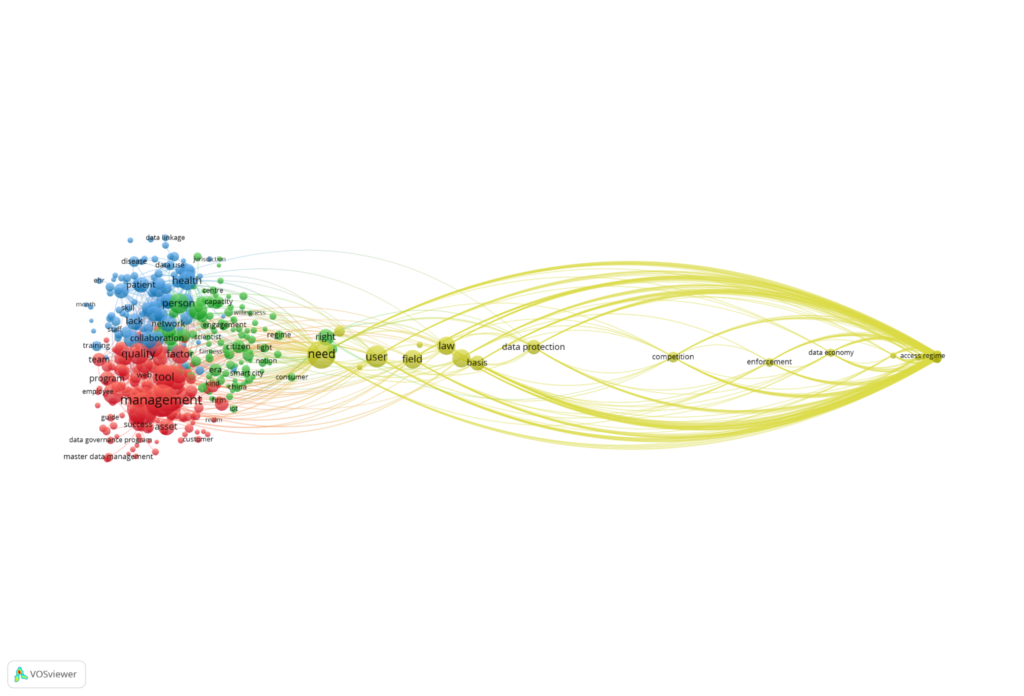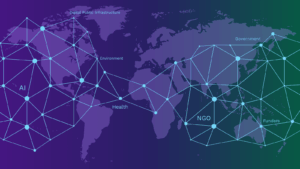A new paper by Datasphere Initiative Senior Fellow 2021/2022, Tim Davies provides a preliminary mapping of academic literature on data governance and explores how the conceptual framework of the “Datasphere” can help bridge research silos.
Launched this week at the Internet Governance Forum in Addis Ababa, Ethiopia, where data was a topic of much debate, the paper raises some thoughtful considerations on why connecting disparate academic writing on data governance will be important to fully grasp the complexities of this expanding and transdisciplinary area of research.
In recent years, the term data governance has garnered growing attention. It has moved from being a niche topic, addressed solely as a technical aspect of data sharing projects, or within enterprise Information Communication Technology disciplines as a companion to data management, to becoming the overarching container for thinking about both data protection and access to data.
However, the relatively rapid convergence of interest from policymakers, technologists, activists, and practitioners on ‘data governance’ comes with some challenges. Different agendas, conceptualizations, concerns, and areas of emphasis collide, and there is not yet a coherent field of data governance research.
The paper finds that while there is no single data governance academic field to speak of, literature related to data governance is growing and covers many different disciplines from computer science to health. Work is often concentrated in the United States and the definitions of data governance increasingly foreground both benefits and harms of data use.
A deeper dive into the interactive graphics included in the paper points to how writings on data governance are covering a wide range of issues addressed more often than not through silos.

The striking results form a ‘fish-like’ diagram indicating four clusters:
- The outlier yellow cluster made up of terms related to legal and international policy agendas (law, data protection, competition, access regime, data economy, enforcement, etc.);
- the red cluster centered on data management and quality;
- the blue cluster covering terms like health, patient, and data linkage;
- and a green cluster containing terms such as citizen, engagement, consumer, smart-city, and rights.
A number of preliminary conclusions can be drawn from this diagram, which illustrates the arguably disparate environment of writings around data governance.
Firstly, the legal and regulatory literature more-or-less ‘sits outside’ both information systems literatures, and applied data governance literatures in fields such as health care. Secondly, issues of data management, the rights of data subjects, and the application of data are tightly linked. Thirdly, zooming into the map and looking at the presence or absence of particular terms, reveals that issues around jurisdiction receive relatively little attention, and novel methods of data governance such as trusts, data stewardship, and open data do not appear to currently play an influential role in the current academic literature.
Reflecting on the results of the analysis, the author Tim Davies said “There is work to be done to better connect work on legal approaches to cross-boundary data governance, with current work on organizational data governance practice. The concept of the Datasphere can support efforts to both find the connections between, and draw clear distinctions within, currently disparate academic and policy writing on data governance.”
Acknowledging its methodological and scope limitations, the paper builds on other Literature Reviews to put forward new thinking on how academic literature is engaging in data governance. It complements the intelligence gathered in the Datasphere Governance Atlas which mapped the organizations working on data governance, compiling knowledge on current academic and policy writing.
“By understanding the trends in academic literature and how the term the “Datasphere” is being leveraged, we can be more intentional and aware about policy research needs in this complex cross-sectoral field and highlight the connections and silos that need addressing,” said Carolina Rossini, Director, Research & Partnerships.




